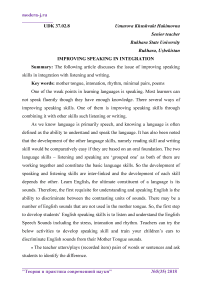Improving speaking in integration
Автор: Umurova Kh.H.
Журнал: Теория и практика современной науки @modern-j
Рубрика: Образование и педагогика
Статья в выпуске: 5 (35), 2018 года.
Бесплатный доступ
The following article discusses the issue of improving speaking skills in integration with listening and writing.
Mother tongue, intonation, rhythm, minimal pairs, poems
Короткий адрес: https://sciup.org/140273148
IDR: 140273148
Текст научной статьи Improving speaking in integration
One of the weak points in learning languages is speaking. Most learners can not speak fluently though they have enough knowledge. There several ways of improving speaking skills. One of them is improving speaking skills through combining it with other skills such listening or writing.
As we know language is primarily speech, and knowing a language is often defined as the ability to understand and speak the language. It has also been noted that the development of the other language skills, namely reading skill and writing skill would be comparatively easy if they are based on an oral foundation. The two language skills – listening and speaking are ‘grouped one’ as both of them are working together and constitute the basic language skills. So the development of speaking and listening skills are inter-linked and the development of each skill depends the other. Learn English, the ultimate constituent of a language is its sounds. Therefore, the first requisite for understanding and speaking English is the ability to discriminate between the contrasting units of sounds. There may be a number of English sounds that are not used in the mother tongue. So, the first step to develop students’ English speaking skills is to listen and understand the English Speech Sounds including the stress, intonation and rhythm. Teachers can try the below activities to develop speaking skill and train your children’s ears to discriminate English sounds from their Mother Tongue sounds.
-
• The teacher utters/plays (recorded item) pairs of words or sentences and ask students to identify the difference.
-
• Write “Minimal Pairs” like “tin, thin” “can, cane” “watch, wash” and read aloud before your children. Ask your children to identify the correct word.
-
• Teach your students primary stress, secondary stress, intonation and sentence stress.
-
• Watch BBC or other English standard channels and observe the mouth movements, style and the way they talk.
-
• Slow your speech until you learn stress, intonation and rhythm.
-
• English poems, Music, and Movies are some of the best ways to improve your English speech.
-
• Use Dictionary and Read English Books, Lyrics etc. Read them again and again.
-
• Record your own speech. Replay and correct it.
-
• Start talking to friends/parents/teachers
-
• Start writing a diary
-
• Make use of internet and computer for analyzing one’s English pronunciation
If you deal with a group of participants who do not know each other, group building activities can create a secure and friendly atmosphere. The relationship of the participants with each other is very important for group dynamics. The Facilitator can make or break trust by making verbal comments, his/her body language, etc. Group activities based on a shared task bring the participants closer, both physically and emotionally. Group activities should allow the participants to take different roles (leader, reporter or a task manager), try to offer something for each learning style (visual, kinaesthetic, etc.) and let participants demonstrate their different abilities (drawing, story-telling, poem composing, analysing, etc.). Above-mentioned speaking activities can be used in EFL classes for promoting students’ self-confidence. Yet, we would like to note that not all activities can be effective. It is teachers’ responsibility to choose or adapt materials according to the students’ level of English and fields of interests. ESP teachers may reform the speaking activities in accordance with their students’ professional interests. For instance, if it medical school students, activities can be changed into the topics on medicine. Through this, teachers will help their students to develop their English in accordance with their future profession.
Список литературы Improving speaking in integration
- Cutrone, P. (2001) Learner attitudes towards EFL teachers in an English conversation school in Japan. TheLanguage Teacher 24, 21-24.
- Doyon, P. (2000). Shyness in the EFL class: why it is a problem, what it is, what causes it, and what to do aboutit. The Language Teacher 24. Retrieved 12 December 2001 from Ellis, R. (1994).
- Horwitz, E., Horwitz, M., & Cope, J. (1986). Foreign language classroom anxiety. Modern Language Journal26, 125-132.
- Luoma, S. Assessing speaking. Cambridge, England: Cambridge University Press. 2004
- Williams, C. (1994). Situational behavior in the language classroom. The Language Teacher 18, 10-11.


